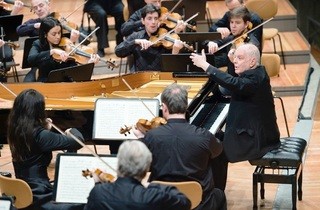|
Back
A Kind of Cosmos New York
Isaac Stern Auditorium, Carnegie Hall
01/29/2017 -
Wolfgang Amadeus Mozart: Piano Concerto No. 23 in A Major, K. 488
Anton Bruckner: Symphony No. 9 in D Minor
Staatskapelle Berlin, Daniel Barenboim (Music Director, Pianist, Conductor)

D. Barenboim, Staatskapelle Berlin (© Monika Ritterhaus)
“I think in all sincerity that I should suggest to the Holy Father that this grandiose “Ninth Symphony” be declared a Sacred Work.”
Wilhelm Furtwängler
After attending seven of the nine Bruckner symphonies in this mammoth period by Daniel Barenboin and his Staatskapelle Berlin, I had a heretical thought. Mr. Barenboim had just finished the Adagio movement from the 23rd Piano Concerto, and it occurred to me–oh Apostate, Schismatic, Blasphemer, curséd by the Almighty–that perhaps these twelve minutes of Mozart were more tragic, more compassionate, more sheerly beautiful, than all ten hours of Bruckner this whole week.
And granted, this could have been partly due to being theoretically over-Brucknered. Yet that was unlikely, since Maestro Barenboim’s love for Bruckner goes back over six decades. And his admiration for the composer’s mystical conductor, Wilhelm Furtwängler–a heterodox choice in the 1950’s–is singleminded.
Perhaps that thought arose because...well, because Mozart’s Adagio movement expressed in a few bars all the pathos and tragedy of the human mind. Bruckner was forever reaching for God, and his tragedy was never reaching his goal. Mozart was of the earth, pure humanity.
Actually, one slightly regrets that eight of the nine symphonies were prefaced by a Mozart concerto. Like a huge tableau of earth and sky, a bijou, no matter how perfect, can seem distracting. Not only that, but Mr. Barenboim’s performances varied greatly.
Last night, the outside movements of the 23rd Concerto were, if not an embarrassment, simply not the quality of the composition itself. Staatskapelle Berlin, usually so careful, seemed to be flubbing its notes, and Mr. Barenboim, playing the right notes, was offering the piano as a tool. Yes, this Concerto offers the deepest emotional content, but Mr. Barenboim seemed to omit both elegance and fluidity.
That aforesaid Adagio was of course the exception. It is a priceless conception, its simplicity hides unending artistic pathos (never bathos), and Mr. Barenboim’s performance offered all the weight and underlying passion.
As for the Ninth–the other “D Minor Ninth Symphony”, which it ofttimes resembles, Mr. Barenboim brought his orchestra to the same supposedly inimitable apex which he accomplished throughout the week. This was one case of having had to be there (and not a seat was empty in the Isaac Stern Auditorium).
The first movement did, yes, have the Beethoven tread, the measured opening giving away to the most massive brass consort up to Janácek’s Sinfonietta. Here were eight horns (four doubling as Wagner Tubas), three trumpets, three trombones, a regular tuba. And they were all given a mighty workout throughout this beginning.
And now we come to the greatest Scherzo of all nine symphonies. “Scherzo” is of course a misnomer here. This is chilling stuff. For the literary, it comes out of Dante’s Hell. For the more literal, Wagner could have used this music for the anvil scene of the Nibelungs. Mr. Barenboim gave it a fearful ring, an ominous sound, the brass and timpani clashing into what Bruckner might have considered either Hell–or the End Days.
No words for the Finale. Those strings of the Staatskapelle Berlin, the deliberate yet rounded tones built up to a glorious high Wagner Tuba note, and then died down again. Where the rest of the work was given with enormous breadth, this was without breath at all. A suspended moment, held together by Bruckner’s equivalent of a blessing.
Needless to say, the applause was overwhelming., Mr. Barenboim entered and re-entered the stage for 15 minutes, was given dozens of roses, and obviously enjoyed his triumph.
Yet if any words can speak of the last movement, they are the opposite of this usual cathedral greatness. Donald Tovey was the author:
“At the finish (of Bruckner’s Ninth Symphony), there should be the humility you feel when a simple old soul talks to a child about sacred things.”
This was not a humble performance, but its greatness can frequently convey humility in us all-too-earthbound listeners.
Harry Rolnick
|